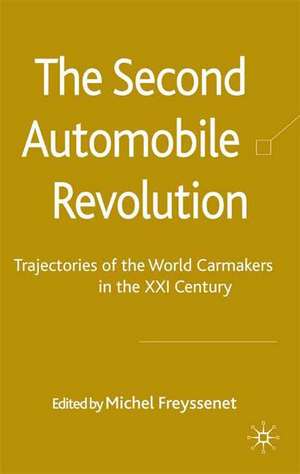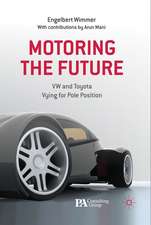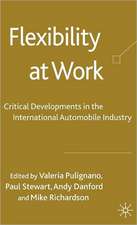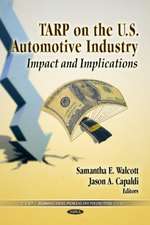The Second Automobile Revolution: Trajectories of the World Carmakers in the 21st Century
Editat de M. Freysseneten Limba Engleză Hardback – 30 apr 2009
| Toate formatele și edițiile | Preț | Express |
|---|---|---|
| Paperback (1) | 649.87 lei 6-8 săpt. | |
| Palgrave Macmillan UK – 30 apr 2009 | 649.87 lei 6-8 săpt. | |
| Hardback (1) | 651.34 lei 6-8 săpt. | |
| Palgrave Macmillan UK – 30 apr 2009 | 651.34 lei 6-8 săpt. |
Preț: 651.34 lei
Preț vechi: 766.28 lei
-15% Nou
Puncte Express: 977
Preț estimativ în valută:
124.65€ • 129.34$ • 104.18£
124.65€ • 129.34$ • 104.18£
Carte tipărită la comandă
Livrare economică 18 martie-01 aprilie
Preluare comenzi: 021 569.72.76
Specificații
ISBN-13: 9780230219717
ISBN-10: 0230219713
Pagini: 468
Ilustrații: XXI, 468 p.
Dimensiuni: 140 x 216 x 32 mm
Greutate: 0.72 kg
Ediția:2009
Editura: Palgrave Macmillan UK
Colecția Palgrave Macmillan
Locul publicării:London, United Kingdom
ISBN-10: 0230219713
Pagini: 468
Ilustrații: XXI, 468 p.
Dimensiuni: 140 x 216 x 32 mm
Greutate: 0.72 kg
Ediția:2009
Editura: Palgrave Macmillan UK
Colecția Palgrave Macmillan
Locul publicării:London, United Kingdom
Cuprins
Foreword; B.Jullien Introduction: Ten Years on, What Have we Learnt? M.Freyssenet Wrong Forecasts and Unexpected Changes. The World that Changed the Machine; M.Freyssenet Strategies of Internationalization of Automobile Firms in the New Century: A New Leap Forward? B.Jetin PART I: THE DIVERGENT TRAJECTORIES OF JAPANESE AND KOREAN CARMAKERS Sigh of Toyota as the New World n°1 Carmaker; K.Shimizu Nissan: From the Brink of Bankruptcy; M. Stevens and T.Fujimoto Honda: Serendipity or Strategy from 1997-2007? D.J.Luethge & P.Byosiere The Rebirth of Mazda Under Ford's Shadow; D. Arturo Heller Hyundai: Is It Possible to Realize the Dream of Becoming a Top 5 Global Automaker by 2010? M.Chung PART II: THE RESISTIBLE DECLINE OF THE 'BIG THREE' General Motors in an Age of Corporate Restructuring; R.Senter & W.McManus Ford 1993 to 2007: Losing Its Way? G.Mercer Can Chrysler Survive its Re-invention? B.Belzowski PART III: THE RESISTANCE OF LEADING EUROPEAN CARMAKERS The Final Chapter of the „VW Model'? The VW Trajectory 1995-2005; U.Jürgens PSA: the Difficulties of a 'Volume and Diversity' Profit Strategy; M.Freyssenet Renault 1992-2007: Globalization and Strategic Uncertainties; M.Freyssenet Fiat Group Automobiles – An Arabian Phoenix in the International Auto Industry; G.Volpato From the Marriage in Heaven to the Divorce on Earth. The DaimlerChrysler Trajectory Since the Merger; H.Köhler Driving with Engineers' Professionalism and Family Values. The BMW Trajectory from a Regional Carmaker to a Global Premium Player; L.Pries A Break from the Past: Volvo and its malcontents; M.Holweg and F.K.Pil Production Counterfeits and Policy Collisions: the Rover trajectory – a salutary tale; D.Coffey PART IV: NEWCOMERS AND GLOBAL SUPPLIERS Made in China: Joint-Ventures and Domestic Newcomers; H.Wang Maruti-Suzuki's Trajectory: From a National Champion to a Japanese owned Subsidiary; F.Becker-Ritterspach Winners and Losers in the Auto Parts Industry: Trajectories Followed bythe Main First Tier Suppliers over the Past Decade; V.Frigant Conclusion. The Second Automobile Revolution. Promises and Uncertainties; M.Freyssenet Index
Notă biografică
MICHEL FREYSSENET is Research Director at Scientific Research National Center (CNRS) in Paris (France). He is co-founder of GERPISA and currently a member of its international steering committee. His main topics of interest are: productive models, national growth models, world productive recomposition, history of work division and social relationships theory. One of his key publications in English is The Productive Models: the Conditions of Profitability (Palgrave Macmillan, 2002 (with R. Boyer). His personal website is: http://freyssenet.com.
GERPISA (Groupe d'Étude et de Recherche Permanent sur l'Industrie et les Salariés de l'Automobile, École des Hautes Études en Sciences Sociales-Paris) is a French-based international network, formed in 1992. Now with 450 members from 29 countries, it links economists, management researchers, historians and sociologists working on the auto industry. This book is one of the products of its fifth international research programme 'Sustainable Development and Automobile Industry', run between 2007 and 2010.












